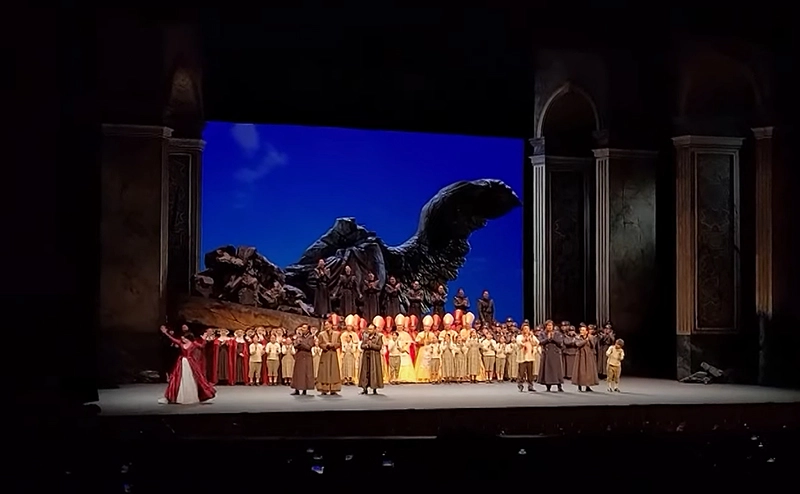World-renowned soprano Angela Gheorghiu’s behavior in an opera house has sparked controversy.
During a recent performance of the opera Tosca in Seoul, Korea, Georgie’s unexpected behavior led to an interruption of the performance and her refusal to take the curtain call.
Her behavior wasn’t just a fluke, but has garnered attention because of similar instances in the past.
The performance was the final scene of the much-anticipated production of Tosca, especially after the male lead’s signature aria, “In Shining Light.
It’s one of the most memorable moments in the opera, and it’s one of the most popular parts of the show, with audiences cheering. But on this particular night, Georgue cut the music right after this highlight and shouted at the audience from the stage.
“This is an opera, not a recital. Respect me,” which was met with cheers from the audience and a strong rejection of encore demands.
While encore demands during a performance are uncommon, they do happen in opera. Back in 1994, when Luciano Pavarotti was asked for an encore at Milan’s Scala Theater, he graciously obliged and graced the stage one more time.
Last year, at the same venue, tenor Yong-Hoon Lee also sang “Kor light” from “Turandot” as an encore, to an enthusiastic response from the audience.
Angela Gheorghiu, however, had a completely different reaction to the situation: her words and actions shocked the 3,000 people in the audience, and there were subsequent complaints from the audience.
After the performance, there was a curtain call where the chorus members and supporting actors came on stage one after another to say goodbye, but Angela Gheorghiu was nowhere to be seen.
After a while, she walked out onto the stage, but when the audience cheered and booed at the same time, she went backstage. The curtain call itself was a disaster, and the audience erupted in disappointment and anger.
Georgie has since taken to social media to take a strong stance against the rule: “I do not recognize encores in opera. I will demand an apology from the Korean audience,” she announced, making no secret of her offense.
However, many audience members responded to her behavior by saying, “We came here to enjoy the beauty of the opera, and we feel insulted.”
This incident has become more than just an issue of performance demeanor, but a discussion about the responsibilities and stage manners of a global star. Angela Gheorghiu has caused controversy in the past.
In 2013, she had a similar incident at a performance at the Metropolitan Opera in New York City, where she clashed with audience members on stage.
Since then, there have been several other instances of her unprofessional behavior, leading to criticism that her “world-class” title is unearned.
Angela Gheorghiu’s reputation is likely to take a major hit as a result of this incident. Having failed to live up to the expectations of her audiences, and having put her own emotions ahead of theirs, it will be interesting to see how she handles this crisis.
Meanwhile, opera fans are also debating whether or not this situation is the fault of the director and those involved in the performance. It’s being pointed out that there needs to be clear rules and communication about how performances should be conducted.
Georgy’s behavior is not only controversial in Korea, but also on the international stage. The media and opera fans around the world are expressing different opinions about her behavior.
The incident in South Korea is expected to have a significant impact on her future performances. It is a reminder that a star’s reputation is not only based on the artistic skills they display on stage, but also on their off-stage demeanor and interaction with the audience.
All eyes will be on Angela Gheorghiu going forward to see what changes she will make in the opera world and what stance she will take on her onstage behavior.
It will be interesting to see how she handles this situation and if she can rebuild her reputation once again.

